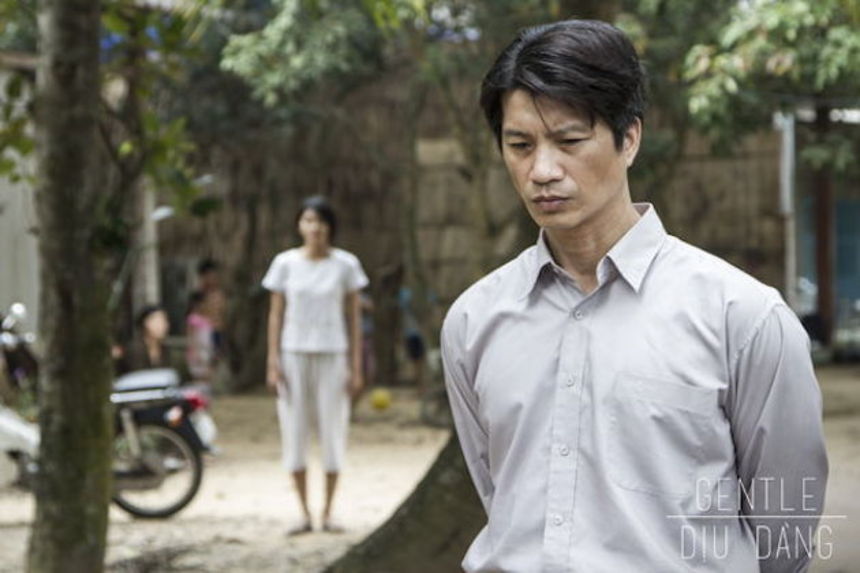Warsaw 2014 Review: GENTLE, A Polished And Splendidly Acted Adaptation Of Dostoyevsky's Touching Short Story

From the viewpoint of someone who has never read the aforementioned piece it seems all the more fascinating to observe how the profound, often distressing story of emotional disconnect in a marriage without any real future prospects unravels on the big screen.
Dostoyevsky's short has been adapted into feature films a few times before (most notably by Robert Bresson in 1969, under the French title Une femme douce), and it's actually not the first time that a director from a country that's still undergoing massive changes, both cultural and political, tries to adapt 'A Gentle Creature' so as to fit the economic and social landscape of his homeland. The picture I'm referring to here is Prasanna Vithanage's 2012 With You, Without You, an expressive and tender Sri Lankan drama that links Dostoyevsky with the ethnic differences of its main characters in a most marvelous and realistic manner.
Though there's no mention of race or ethnicity in Gentle, it's the inequality and social divide amongst Vietnamese citizens that serve as backstory for the elegantly moving tale, which, with enough attention to its universally accessible message, could very well be transported to any other place in the world.
Seeing the film without reading anything about it beforehand might have its many advantages, mainly due to the deceptive nature of the proceeding events, highlighted by the gradual transition of the characters' attitude and the tonal shifts found in some of the picture's most striking and dubious moments.
The story of a learned but troubled pawnbroker who saves a poor young beauty from the hands of her two devious aunts wouldn't perhaps be as compelling, or even theatrical in its portrayal of a toxic marriage, if not for two marvelous performances given by the two leads. Dustin Nguyen, who made a name for himself in Hollywood in late 80's/early 90's, paints a strikingly vivid picture of a dominant, yet ultimately weak-kneed husband, whose indecisions and emotional stagnancy cause distress within the household. The man's pathological inclination towards a dispassionate marriage takes an even more serious turn right after he draws a gun.
Nguyen Thanh Tu acts accordingly, giving her character a broad palette of emotions that allow her to go through the rough process of transformation with enough conviction and self-restraint. The covert sense of annoyance, the deep sadness that fills her heart - the subtle implications of suicidal behavior are there for the whole world to see, yet, on the other hand, it's never clear if that's what lead to her tragic end so scrupulously depicted in the film's opening sequence.
Although one of the first scenes, in which Thien looks as though he's grieving the loss of his wife, straightforwardly implies suicide, it's hard not to notice how forcefully the story hints at a much more extreme outcome. The key to understanding the relationship between the characters, or rather lack thereof, lies in the protagonists' behavior, simplest gestures, and eyesight, all brought to the screen with utmost care.
Le-Van Kiet's mania for detail, coupled with the razor-sharp precision of his mise-en-scene, gives the film a stunningly sublime ambiance. The dichotomy of love versus arranged marriage as envisioned by the director is finely elevated by a growing sense of fear and isolation coming from the wife's side, and by increasing feeling of jealousy and irritation marked by husband's short yet sudden and violent outbursts.
One of the most far-reaching aspects of the whole scenario occupies the spiritual sphere, which serves as an initiator of a fiery argument between the couple. Linh seeks solitude within the walls of a local Christian church, but her cry for help is quickly silenced by Thien's mistrustful rant against Linh's newfound friendship with a familiar religious figure.
Characterized by scrupulous direction and wonderful performances, Le-Van Kiet's departure from more raunchy and gritty material (House in the Alley, Bay Cap 3) visualizes Dostoyevsky's inspiring and timeless short story in a way that will definitely appeal to audiences in need of a solid and clear-sighted drama. Even more convincing is the fact that, on a technical level, it's nothing short of beautiful - underlining the luminosity of one location (the old home) and pinpointing the bleakness of another one (the new home) deliberately shows which place is closer to Linh's shattered heart.

Do you feel this content is inappropriate or infringes upon your rights? Click here to report it, or see our DMCA policy.






